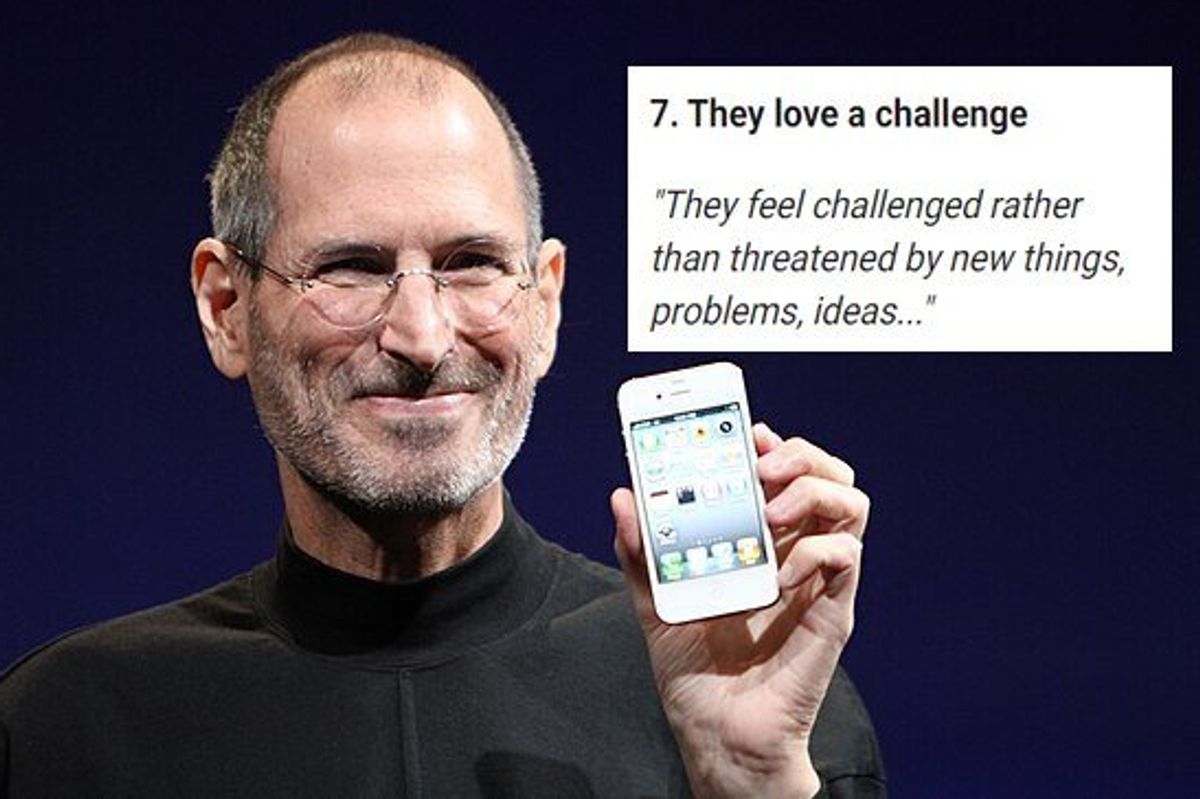How do you know someone is very smart? Here are 15 'subtle signs' people notice.
"You can understand both sides of an issue and still think one is wrong."

Steve Jobs shows off iPhone 4 at the 2010 Worldwide Developers Conference.
There is a big difference in how highly intelligent people communicate versus those with smaller IQs. A Redditor named Occyz wanted to know how people tell the difference by asking them to share the “subtle” signs that someone is very intelligent.
The question was a big hit on the forum, receiving over 3,700 responses.
A big takeaway is people think highly intelligent people are mentally flexible. They are always interested in learning more about a topic, open to changing their minds when they learn new information and acutely aware of what they don’t know.
In fact, according to the psychological principle known as the Dunning-Krueger effect, there is a big confidence chasm between highly intelligent people and those who are not. Low-IQ people often overestimate what they know about topics they need to familiarize themselves with. Conversely, people with high IQs underestimate their knowledge of subjects in which they are well-versed.
Here are 15 “subtle” signs that someone is highly intelligent.
1. They admit their mistakes
"When someone can admit a mistake and they know they don’t know everything."
2. Great problem-solvers
"They're very good at problem-solving. Even if it's something they have no experience with they always approach the problem from the right angle."
3. They appreciate nuance
"'I can hold two opposing ideas in my head at the same time.' Anyone who is willing to do that is intriguing to me. Especially with polarizing issues. They might actually be interesting to talk to."
"I like to call it being smart enough to know how stupid you are."
"They struggle with imposter syndrome. Dumb people always think they’re [great]."
The great American poet Charles Bukowski once wrote, “The problem with the world is that the intelligent people are full of doubts and the stupid ones are full of confidence,” and according to science, he’s correct.
“Ignorance is associated with exaggerated confidence in one’s abilities, whereas experts are unduly tentative about their performance,” Stephan Lewandowsky Chair of Cognitive Psychology, University of Bristol, writes for the World Economic Forum. “This basic finding has been replicated numerous times in many different circumstances. There is very little doubt about its status as a fundamental aspect of human behavior.”
6. They ask questions
"They are ok with being perceived as 'stupid' by asking questions — if we hold back in fear, we'll never truly learn. Plus, it's a good way to show others it's ok to question things if you don't understand — better off if we're on the same page instead of hoping things work out without being informed."
7. They love a challenge
"They feel challenged rather than threatened by new things, problems, ideas..."
"'I don't know' is the beginning of a puzzle, not the conclusion."
9. They can simplify big ideas
"Fantastic teachers can make learning nearly effortless."
10. They listen to people they disagree with
"They don't continually need to tell people how intelligent they are."
This idea is backed up by science. A study published by IFL Science found that people who score high on intelligence tests answer easy questions quickly. However, they spend more time on questions complex questions than their less intelligent peers. They have the intelligence to wait until their entire brain has grappled with a problem before answering.
15. They are great storytellers
This article originally appeared last year.
- Five reasons rabbits make the best indoor pets ›
- You may suffer from 'impostor syndrome.' Lots of smart people with signs of high achievement do. ›
- People share the 18 things that are a 'subtle sign' someone is really smart ›
- 5 signs of intelligence commonly mistaken as weaknesses - Upworthy ›
- Steve Jobs' trick to solving problems - Upworthy ›
- 15 'subtle' signs that someone is highly intelligent - Upworthy ›
- 15 'subtle signs someone is super smart - Upworthy ›
- The one sign that someone is highly intelligent, according to philosopher Arthur Schopenhauer - Upworthy ›







 A Gen Zer takes notes in a notebook.
A Gen Zer takes notes in a notebook.
 In a 4-day model, kids often (but not always) receive less instructional time. Photo by
In a 4-day model, kids often (but not always) receive less instructional time. Photo by 
